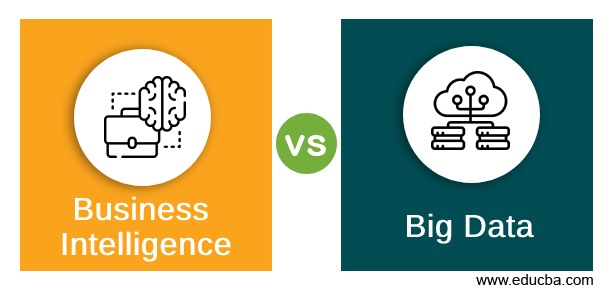Updated April 29, 2023
Difference Between Business Intelligence vs Big Data
Business Intelligence, in simple terms, is the collection of systems, software, and products that can import large data streams and use them to generate meaningful information that points toward the specific use case or scenario. Big data is the most buzzing word in the business. Big Data is changing our day-to-day business life. Everybody thinks that Big Data is nothing but a massive amount of data. But in reality, it’s not just a massive amount of data; it is also about the structure of the data, processing the data to deliver added value to the organization.
Head-to-Head Comparison Between Business Intelligence vs Big Data (Infographics)
Below are the top 6 comparisons between Business Intelligence vs Big Data:
Key Differences Between Business Intelligence vs Big Data
Given below are the Key Differences Between Business Intelligence vs Big Data:
- Both BI and Big data goal is to help the business to make good decisions by analyzing the vast datasets to expand the business and optimize the cost.
- This data analysis not only enables decision-making but also involves an active part in the development of strategies and methods that make sure the success of organizations. This data analysis can be called “Business Intelligence,” whereas “Big Data” is a relatively new term for Business intelligence.
- Since the time of BI, the volumes of data sets become incredibly large; the best example we can consider is social media. As a result, more effort and strategies should be applied to tackle them and make them useful for successful business.
- Business Intelligence helps us find the answers to the business questions we know, whereas Big Data helps us find the questions and answers we didn’t know before.
- Although Business Intelligence and Big Data are two technologies used to analyze data sets to help organizations in decision-making, they have differences. They both differ in the way they analyze the data.
- Business Intelligence is based on combining all business data sets into a central server; this data will be analyzed offline after saving the information in a platform or environment called Data Warehouse. The data sets are structured in a relational database with additional indexes and forms of access to the tables in the warehouse.
- In the Big Data environment, data is stored on a distributed file system (e.g., HDFS) rather than a central server. Data will be distributed across the worker nodes for easy processing. Distributed File System is much safer and more flexible.
- BI solutions carry the data to the processing functions, whereas Big Data solutions take the processing functions to the data sets. Since the analysis is positioned around the information (Data), it is simpler to handle more significant amounts.
- BI solutions are more towards structured data, whereas Big Data tools can process and analyze data in different formats, both structured and unstructured.
- Big Data solutions can process historical data and data coming from real-time sources, whereas Business Intelligence processes historical data sets.
- Big Data technology uses parallel processing concepts (Map reducing algorithm), which improves the speed of analyzing and processing the data sets by distributing jobs into several similar execution processes; in the end, the results are combined and shown; this makes analyzing large volumes easier.
Business Intelligence vs Big Data Comparison Table
Given below is the comparison table of Business Intelligence vs Big Data:
| Comparison of Objectives | Business Intelligence | Big Data |
| Purpose | The purpose of Business Intelligence is to help the business to make better decisions. Business Intelligence helps deliver accurate reports by extracting information directly from the data source. | The primary purpose of Big Data is to capture, process, and analyze the data, both structured and unstructured, to improve customer outcomes. |
| EcoSystem / Components | Operation systems, ERP databases, Data Warehouse, Dashboard, etc. | Hadoop, Spark, R Server, hive, HDFS, etc. |
| Tools | Below is the list of tools used for business intelligence. These tools enable businesses to collate, analyze and visualize data to make better business decisions and develop good strategic plans.
|
Below is the list of tools used in Big Data. These tools or frameworks store a large amount of data and process them to get insights from data to make good decisions for the business.
|
| Characteristics/ Properties | Big data can be described by volume, Variety, Variability, Velocity, and Veracity. | Below are the six features of Business Intelligence Location intelligence, Executive Dashboards, “what if” analysis, Interactive reports, Metadata layer, and Ranking reports. |
| Benefits | Below is the list of benefits of Business Intelligence:
|
Below is the list of benefits of Big Data:
|
| Applied Fields | Social Media, Healthcare, Gaming Industry, Food Industry, etc. | The Banking Sector, Entertainment, Social Media, Healthcare, Retail, Wholesale, etc. |
Conclusion
In the present era, the importance of data in business is vital; meaningful decisions can be made only by analyzing the data, and these decisions will help businesses to grow further. Both BI and Big data help to analyze the data to get insights and view the relevant data. Business intelligence and Big Data need to be synchronized and used together. They are not the same thing, but they share many of the same common goals. Many distinctions between Business intelligence and Big Data tend to be arbitrary.
Recommended Articles
This has been a guide to Business Intelligence vs Big Data. Here we discussed Business Intelligence vs Big Data head-to-head comparison, key differences, infographics, and a comparison table. You may also look at the following articles to learn more –




